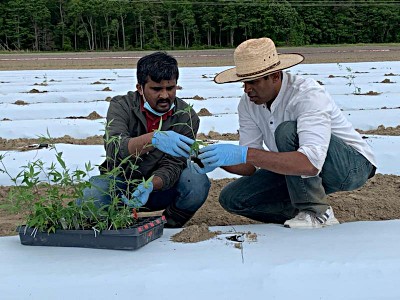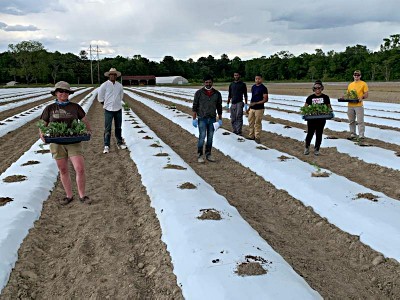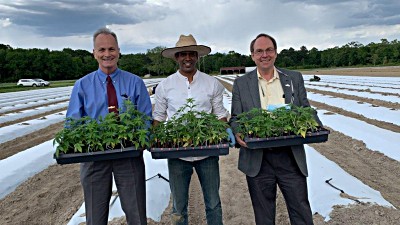
PRINCESS ANNE, MD-(June 2, 2021)-University of Maryland Eastern Shore researchers involved in its Industrial Hemp Pilot Research Program took to the fields early last month for a hemp cultivar screening trial. Some 43 cultivars were planted that will be screened for cannabinoid production on the Eastern Shore where it shows promise as a potential cash crop for farmers.
The study will track cannabidiol (CBD) and tetrahydrocannabinol (THC) levels at weekly intervals following flower initiation, Dr. Sadanand Dhekney, an associate professor in UMES’ Department of Agriculture, Food and Resource Sciences and director of the program, said. The research team will also record biomass yield in various cultivars. Industrial hemp includes the plant Cannabis sativa L. and any part of the plant with a THC concentration of no more than 0.3% on a dry weight basis.
“Industrial hemp cultivars grown for seed, fiber or cannabinoids, including CBD, exhibit diverse growth and flower characteristics in response to specific environments,” Dhekney said. “This makes it critical to screen hemp germplasm that will perform well in the soils and climate of the Eastern Shore.”
The Agricultural Improvement Act of 2018 (the 2018 Farm Bill) paved the way for the U.S. Department of Agriculture to set regulations and guidelines to implement a program for the commercial production of industrial hemp in the U.S. In Maryland, farmers are required to partner with institutions of higher education for hemp cultivation under a research program such as UMES’ Industrial Hemp Pilot Research Program established in 2019.
UMES has the research capabilities, plant breeding, biotechnology, plant pathology, plant protection, food quality and processing necessary for such an undertaking, Dhekney said.
“The way the partnership works is the growers work with the university to design a research project that would be carried out in their fields to answer a specific research question,” he said. “The product from the research could be sold by the grower to make a profit. At the same time, it would allow the university to gain science-based information from the project.”

UMES had eight growers from the Eastern Shore and Western Maryland partner with the university to grow industrial hemp under the 2020 pilot program. Farms were selected, Dhekney said, based on their geographical location, soil and microclimate, the owner’s previous experience farming, availability of farming equipment for crop management along with other stipulations set by the Maryland Department of Agriculture. So far this year, seven growers have signed partnership agreements with UMES to grow industrial hemp for cannabinoid production.
“Information gained from these activities are shared with producers and stakeholders through research publications, extension activities and the annual Industrial Hemp Conference,” Dhekney said.
For more information on UMES’ Industrial Hemp Pilot Research Program, visit https://wwwcp.umes.edu/sans/The-Program/.
Captions:
Top: From left, Dr. Papaiah Sardaru, post-doctoral research associate in the plant pathology program at UMES, and Dr. Sadanand Dhekney are shown planting hemp cultivars for the trial.
Above right: Dr. Sadanand Dhekney (second from left) and a group of UMES students are ready to begin planting for the trial which will screen 43 hemp cultivars for cannabinoid production on the Eastern Shore.
Below: UMES faculty members from left, James Bresette, Pharm.D., School of Pharmacy and Health Professions; Dr. Sadanand Dhekney, associate professor, Department of Agriculture, Food and Resource Sciences; and Dr. Jurgen Schwarz, chair, Department of Agriculture, Food and Resource Sciences are pictured with trays of plants for the hemp cultivar trial.
Gail Stephens, agricultural communications, University of Maryland Eastern Shore, School of Agricultural and Natural Sciences, gcstephens@umes.edu, 410-621-3850.


